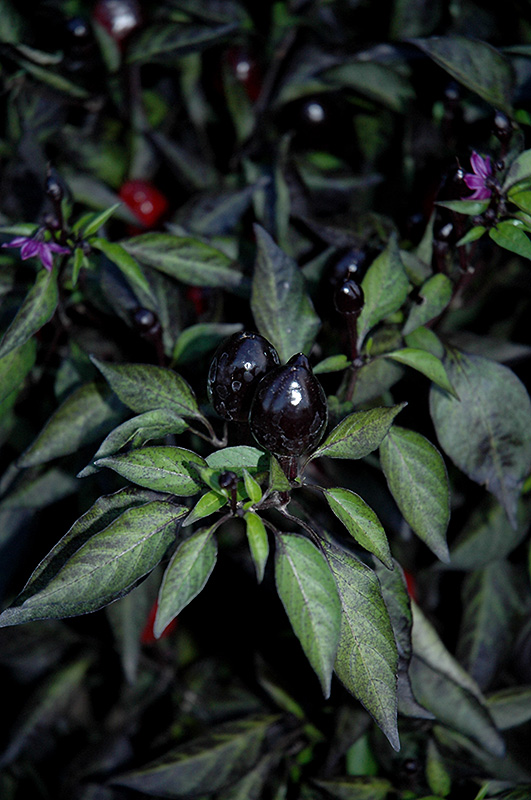PLANT GUIDE
Black Olive Ornamental Pepper
Capsicum annuum 'Black Olive'
Height: 18 inches
Spread: 18 inches
Sunlight:
![]()
Other Names: Ornamental Chili, Chili Pepper
Group/Class: Longum Group
Description:
An attractive ornamental pepper with both colorful fruit and interesting foliage; leaves are green with flushes of dark purple; fruits emerge glossy purple-black and mature to orange-red; a wonderful indoor container accent plant
Features & Attributes
Black Olive Ornamental Pepper's attractive pointy leaves remain green in colour with showy deep purple variegation throughout the year on a plant with an upright spreading habit of growth. It features subtle purple star-shaped flowers dangling from the stems from late spring to mid summer. The black fruit is edible and has a spicy taste and a crisp texture. Note that in general, it can be difficult to get plants to reliably produce fruit indoors; this may be a challenge best reserved for adventurous and experienced gardeners. The purple stems can be quite attractive and add to the plant's interest.
This is an herbaceous houseplant with an upright spreading habit of growth. This plant should not require much pruning, except when necessary to keep it looking its best.
Planting & Growing
When grown indoors, Black Olive Ornamental Pepper can be expected to grow to be about 18 inches tall at maturity, with a spread of 18 inches. It grows at a medium rate, and under ideal conditions can be expected to live for approximately 1 years. This houseplant requires direct sun for optimal performance, and should therefore be situated in a room that gets bright sunlight for a good part of the day; it is not a good choice for rooms lit only by artificial light. It is very adaptable to both dry and moist soil, but will not tolerate any standing water. The surface of the soil shouldn't be allowed to dry out completely, and so you should expect to water this plant once and possibly even twice each week. Be aware that your particular watering schedule may vary depending on its location in the room, the pot size, plant size and other conditions; if in doubt, ask one of our experts in the store for advice. It is not particular as to soil type or pH; an average potting soil should work just fine.
There are many factors that will affect the ultimate height, spread and overall performance of a plant when grown indoors; among them, the size of the pot it's growing in, the amount of light it receives, watering frequency, the pruning regimen and repotting schedule. Use the information described here as a guideline only; individual performance can and will vary. Please contact the store to speak with one of our experts if you are interested in further details concerning recommendations on pot size, watering, pruning, repotting, etc.
-- THIS IS A HOUSEPLANT AND IS NOT MEANT TO SURVIVE THE WINTER OUTDOORS IN OUR CLIMATE --
This tool is an online resource representing many of the varieties that we carry over the course of the season, and is intended for informational purposes only. Inventory varies seasonally, so we cannot guarantee that every plant will be in stock at all times - please contact the store directly for current availability.


